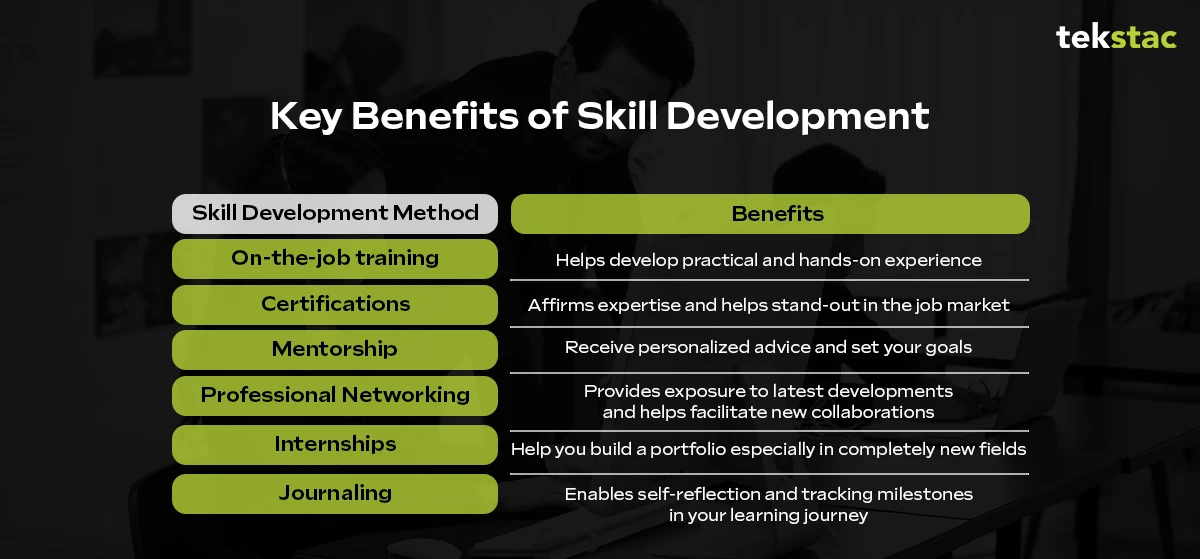What is Skill Development and Why Is It Crucial for Career Growth?

What is skill development?
Diya had a brainwave – A one-of-its-kind idea for what could be the next big thing in the world of start-ups. But she hesitates as she lacks the communication, presentation, and negotiation skills to pitch it to a set of angel investors.
In this context, what could change to help Diya advance in her endeavors and confidently pitch her brilliant idea? In today’s world, skill development is the path to progression as only technical know-how doesn’t suffice in building a successful career.
This raises the question – What is skill development? It is obtaining and enhancing skills and competencies for undertaking tasks effectively and delivering quality work. It is a process to develop and boost individual competency in personal, professional, or academic settings.
Skill development is essential for both personal and professional growth. Whether you are focusing on workplace training programs, career upskilling, or building essential job skills, continuous learning ensures long-term success.
Some examples of skill development could be a coder learning a new programming language, an entrepreneur taking up training in project management, or a fresher taking a course in digital marketing.
Why is skill development crucial for career growth?
Here are some reasons why skill development is important in career growth:
1. Adapting to an ever-changing job landscape
With AI and automation, the job market is more volatile than ever. The need of the hour is to be a professional who is agile, flexible, and capable of adapting to technological shifts through continuous skill development. Organizations today value employees with a mix of technical skills, soft skills, and digital fluency, making career upskilling and reskilling essential for long-term success.
For example – In fields like IT and Technology, medicine, and education, it is not just important but mandatory to adopt new skills and learn new programs. Investing one’s time and effort in continuous learning helps professionals stay relevant during accelerated developments and uncertainties.
2. To avail better career opportunities
By developing new skills, professionals can find avenues to new career opportunities and steady growth in their current designation or position. Research shows that those who dedicate time to upskill and reskill achieve faster career progression and are more likely to attain senior positions.
Organizations must consider this and endorse learning and development to help employees get faster promotions and salary growth.
For example – A professional could get new certifications or seek training in some areas to position oneself as an SME or expert in their field and accordingly negotiate for higher salaries.
3. For better productivity and efficiency
Enhancing your skills leads to greater efficiency and improved productivity at work. Learning modern tools through skill development reduces manual tasks, allowing professionals to focus on strategic initiatives. In fact, companies that invest in employee training see a 24% higher profit margin than those that don’t, highlighting the direct impact of continuous learning on business success.
For example – developing advanced Excel skills can help a professional in the automation of repetitive tasks, finish complex calculations quickly, save time in decision-making, and perform faster and more detailed analyses.
In terms of boosting efficiency, enhancing their skill set can help professionals make fewer errors, and enhance collaboration at work.
4. Being prepared for competition
Employers are looking for professionals with the right skills for innovation and higher efficiency. If you are a professional looking for a job change or aiming to change your career path, then here are some things to do –
- Create a top-notch portfolio to highlight your expertise
- Stay updated with the latest advancements and trends
- Conduct regular self-assessment to identify gaps in knowledge
In a market inundated with candidates having similar qualifications and educational backgrounds, developing valuable skills can help you stand out.
What are some off-beat yet effective ways to develop your skills?
No matter what your budget is, these are some lesser-spoken of but effective ways to develop skills and enhance your abilities:
Finding a mentor
One of the best ways to develop your skills is to find a mentor who will offer you guidance and support related to a specific skill, honing leadership skills, or developing industry knowledge. It could be a senior professional, an industry leader, or a career coach – they will help you identify areas needed for development.
While reaching out to a mentor, please specify what you hope to achieve from the mentorship and how they are a good fit for guiding you. Also, mentorship is truly effective when it is a two-way street wherein, they offer guidance and you can share your insights from your work or skills. You could also offer to assist them where you could help them with research, brainstorm with them, or manage a project.
Volunteering
Probably one of the best ways to help people as well as develop a skill set is to sign up for volunteering with a colleague at your workplace by assisting on a project or by joining a non-profit organization. You could also look for volunteering positions on Google or newsletters to find positions that would benefit your career. This is an underrated yet ideal way to get hands-on experience leading to top-notch job offers and standing out in the job market.
Shadowing experts
Shadowing experienced professionals in a field of your choice is an excellent way to develop practical knowledge, extend your know-how beyond textbooks, and fill the gap between theory and practice. One can shadow professionals by observing the work they do, understanding the methods they use, and the decision-making processes they leverage in real-world situations.
Less explored yet effective ways like finding a mentor or volunteering help enhance skills, with platforms like Tekstac helping organizations offer personalized mentorship and learning paths, thus improving skill development and career prospects.

In a nutshell
Skill development extends beyond learning, helping you realize full potential and rise to the challenges stemming from an ever-changing job market. Schedule some time on a bi-weekly or monthly basis to assess your current skill set and attend training & workshops to improve on those areas.
Develop a solid professional network on a social media platform like LinkedIn to check if your current skill set matches the industry standards, collaborate on projects and exchange notes on best practices and tools.
Maintain a journal to track how your skills evolve with time, stay motivated to achieve your goals and reflect on takeaways from learnings in online courses or training sessions.





